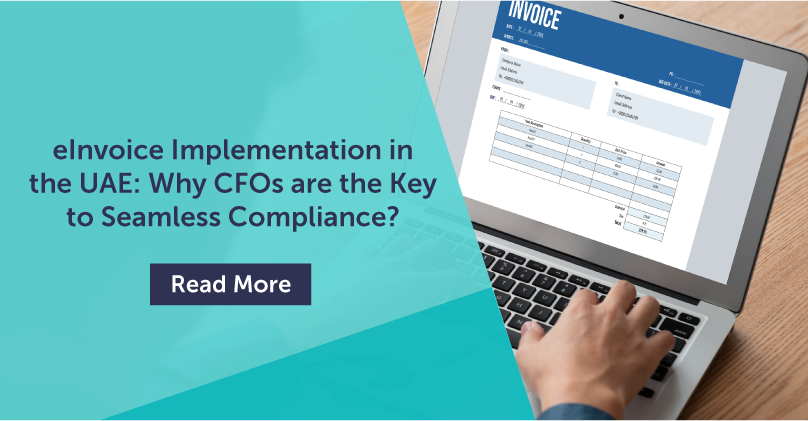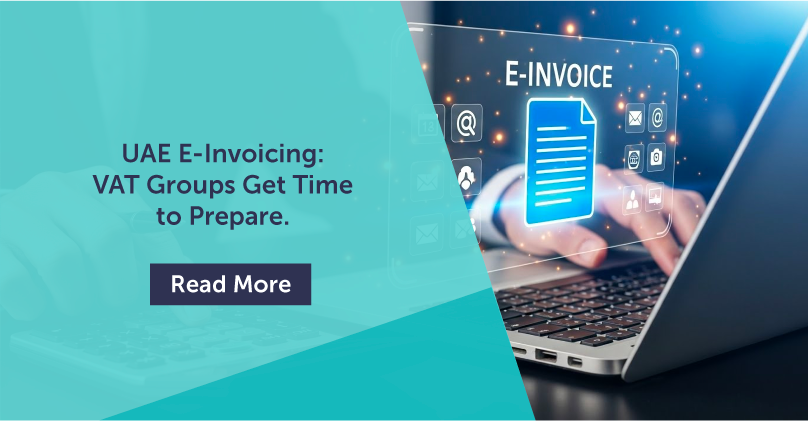
- Jul 14,2025
- All | Digital Transformation | UAE VAT
eInvoice Implementation in the UAE: The CFO’s Strategic Role
Introduction of eInvoicing:
The United Arab Emirates (UAE) is embarking on a transformative journey toward digitalizing its financial landscape with the mandatory implementation of eInvoicing by July 2026 for B2B and B2G transactions. This initiative is a cornerstone of the UAE’s broader vision to modernize its tax infrastructure, enhance transparency, and drive operational efficiency across sectors.
Businesses in the UAE should approach eInvoice implementation as a strategic opportunity rather than just a compliance requirement. The upcoming mandate, effective from July 2026, is designed to modernize tax administration, improve transparency, and streamline business operations across the country. As organizations prepare for this shift, the Chief Financial Officer (CFO) emerges as a pivotal leader in ensuring successful adoption and maximizing the benefits of e-invoicing.
What is eInvoicing in the UAE?
eInvoicing replaces traditional paper, PDF, or unstructured invoices with structured, machine-readable formats, typically XML or JSON, integrated through a standardized framework known as PINT AE. These invoices are issued electronically via accredited service providers (ASPs) in a five‑corner DCTCE model based on the PEPPOL network.
The process links the supplier, the supplier‑ASP, the buyer‑ASP, the buyer, and the Federal Tax Authority (FTA) for real-time invoice validation, data exchange, and tax reporting. This architecture promotes automation, ensures integrity, and facilitates audit-readiness with full traceability.
Implementation Timeline:
eInvoicing becomes mandatory in July 2026 for B2B and B2G transactions, with phased implementation and clear criteria for compliance.
The Importance of eInvoicing:
- Operational Efficiency: Automates invoice processing, reducing manual errors and accelerating payment cycles.
- Compliance: Ensures adherence to evolving tax regulations and provides real-time reporting to authorities.
- Transparency: Enhances audit readiness and reduces the risk of fraud and tax leakage through traceable transactions.
- Scalability: Supports business growth by handling increased invoice volumes efficiently.
The CFO is more than a finance head; they are the strategic anchor for organizational compliance. From establishing governance policies and risk controls to implementing technology that meets regulatory mandates like the UAE’s e‑invoicing system, the CFO ensures that compliance is built in, not bolted on.
By leading cross-functional coordination, cultivating a compliance-aware culture, deploying technology effectively, and working closely with audit committees, CFOs safeguard the company while paving the way for digital maturity, strategic resilience, and stakeholder trust in an increasingly regulated world.
The CFO’s Role in eInvoicing Implementation
1. Strategic Leadership
The CFO must align eInvoicing initiatives with the organization’s strategic goals, ensuring that digital transformation supports broader business objectives. The CFO leads the cultural and operational shift required for successful adoption, addressing resistance and fostering digital literacy within finance teams.
2. Understand Regulatory & Technical Requirements
Study the five-corner PEPPOL model and PINT AE data standards to ensure compliance with MoF requirements.
3. System Gap Analysis & Upgrades
Audit existing invoice processes: ERP/data systems must support structured formats like XML/JSON and capture required fields such as VAT codes, timestamps, and TRNs. Evaluate your current tech stack (ERP, billing platforms) for API readiness and support for formatted eInvoices; install middleware/connectors if needed.
4. Technology and Process Integration
Evaluates and selects eInvoicing platforms that integrate seamlessly with existing ERP and accounting systems, ensuring data accuracy and process automation.
Works closely with IT and external service providers to implement solutions that meet UAE regulatory standards and business needs.
5. Compliance and Risk Management
Ensures all eInvoicing processes comply with UAE tax laws and data protection regulations, mitigating risks of non-compliance and penalties.
6. Cross-Functional Training & Change Management
Train finance, IT, procurement, and operations teams on new XML-based workflows and compliance protocols and appoint a governance team to oversee ongoing compliance, updates, SLA performance, and escalation procedures.
7. Ongoing Monitoring & Adaptation
Maintain continuous monitoring of system performance; watch for regulatory updates from the MoF eInvoicing portal and the ASP network.
Automation can significantly enhance compliance monitoring for VAT regulations in the UAE by streamlining processes, reducing human error, and ensuring real-time adherence to Federal Tax Authority (FTA) requirements.
Automation in the business will support the finance team to shift from the manual working in the VAT compliance checks and documentations and will allow preparation of error free returns. In essence, implementing e‑invoicing is the critical first step toward a fully automated VAT accounting and filing process, delivering compliance, efficiency, and financial resilience.
Conclusion:
The UAE’s eInvoicing mandate is more than a compliance requirement; it’s a catalyst for digital transformation and financial innovation. Businesses should view e-invoicing as a catalyst for broader digital transformation, unlocking operational efficiencies, strengthening compliance, and positioning themselves for future growth in a rapidly evolving regulatory landscape.
CFOs play a key role in guiding their companies through this change. They help make things work better, keep the business compliant, and support steady growth in the digital era.
At this important time, working with expert advisors like CLA Emirates can make a big difference. CLA Emirates has strong experience in UAE tax technology and financial compliance and is ranked 8th in the UAE according to the IAB survey. As part of CLA Global, which is ranked 15th in the world, we help businesses understand eInvoicing, follow best practices, and stay ready for any rule changes.
With support from CLA Emirates, CFOs can guide their organizations through this change, making processes smoother, staying compliant, and helping the business grow in today’s digital world.
Call for Consultation
Mr. Arun Sankaran | Associate Director - Management Accounts
M: +971 50 193 4860
E: arun.sankaran@claemirates.com




